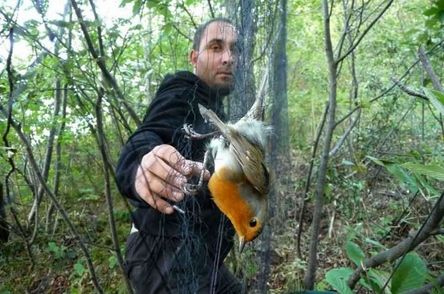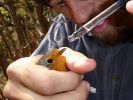Eye For Film >> Movies >> Emptying The Skies (2013) Film Review
Emptying The Skies
Reviewed by: Michael Pattison

There is possibly nothing more distressing to watch on film than an animal aware of, petrified by and struggling against its own imminent death. In Emptying The Skies, a documentary by Douglas and Roger Kass, the creatures in question are migratory songbirds, many of which are dwindling in numbers and some of whose extinction is becoming alarmingly more likely each year as a result of poaching in southern Europe — most prevalently in Cyprus. Though nominal laws are in place to protect these tiny birds, which migrate seasonally to Africa from as far as northern Russia, little is done to enforce them. Consequently, a large number of them are trapped, killed and sold each year for significant profits on the black market — which provides luxury cuisine to petty bourgeois Europe.
Named after a New Yorker article by Jonathan Franzen, Emptying The Skies follows Andrea, Sergio and other volunteers for CABS (the Committee Against Bird Slaughter), who break onto the private land of poachers in order to film the trapped birds before taking care to free them. Most commonly, we see, birds are trapped by limesticks, whereby they are lured onto branches specially draped in strong-holding glue; subsequently, the birds hang upside down for days, their wings and feet stuck, flapping in helpless panic.

Other traps in theory result in quicker deaths, such as that in which a deliberately placed rock falls suddenly on a bird — though, in reality, many birds are merely injured and can lie half-trapped slowly starving to death. Interviewed in the film, Franzen states that if we define and measure animal cruelty by the speed by which a creature is killed, then the limestick is a particularly punishing form of torture. We may go further than this, as presumably Andrea and Sergio would, and note that any killing of a healthy animal is inherently cruel. “The great thing about birds,” Franzen notes in the film, “[is that if] you let them go, you free them, they don’t look back to thank you… They don’t want to be around people.” Who could blame them?
The CABS activists are inexhaustible. Though to begin with the film risks alienating us with the degree to which they confront and provoke poachers on their own land, the broader perspective demonstrates the moral and legal disadvantage at which the volunteers are fundamentally placed, thanks to an incompetent law and a culture of tolerance. Amusingly and unfortunately, it isn’t long before we realise almost by default whose side we ought to be on here: filmed as they respond with apoplectic rage to the CABS intruders, landowners reveal their confused double standards when they clutch at straws to defend their own actions, drifting quickly into racist and class-prejudiced language. There are deeper social implications here, though they remain largely untapped.
CABS’s commitment to passive aggressive activism is enabled today by the democratisation of technology. Armed merely with camera-phones and lightweight video equipment rather than with sticks and bats, their cause is assisted paradoxically by what we might call our surveillance culture. That is, the same system that allows for the formation and preservation of private property has also created a widespread suspicion of being filmed — and offenders’ violent response to being captured in or just after the act is most revealing. The camera is an important political tool. If the revolution isn’t televised, it might at least be recorded.
Reviewed on: 24 Mar 2014

















